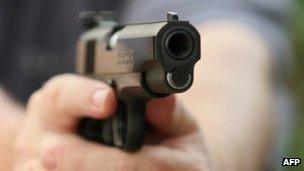UN chief's plea as deadline looms for global arms treaty
- Published

A coalition of campaigners has pressed for a treaty on global arms sales for six years
The UN chief has urged states to bridge differences ahead of Friday's deadline for the draft of a new global agreement to control international arms sales.
Ban Ki-moon said that "very limited progress" had been made during 30 days of talks in New York.
However, a British spokesman was more upbeat, telling Associated Press a historic agreement could be very close.
The global arms trade is estimated to be worth between $60bn and $70bn (£40-50bn) per year.
The US and Russia - among the world's largest exporters of weapons - as well as China, have reservations about an international deal.
The US has long opposed the inclusion of reporting ammunition exports in any text and China does not want small arms to be included. Both Russia and China have also sought restrictions to references to humanitarian law.
Other countries which have expressed concerns about a deal include Syria, North Korea, Iran, Cuba and Algeria.
Good faith
Anna MacDonald, Oxfam: "This is the first time that there's been global regulation on the conventional arms trade"
Any draft treaty that emerges from the talks must be approved unanimously - effectively giving all countries the power of veto.
Mr Ban urged negotiating states to "work in good faith towards bridging their differences".
"We owe it to all the innocent civilians who have fallen victim to armed conflict and violence," he added.
Some 750,000 people are killed by illicit weapons each year.
A spokesman for the British mission to the UN said a new agreement was near.
The spokesman, quoted by AP, said the new text was "a substantial improvement" and that "an historic agreement" to regulate the international trade in conventional arms was now "very close".
On Thursday, a bipartisan group of 51 US senators threatened to oppose any agreement that infringed on the constitutional right to bear arms.
The negotiations on a treaty to establish common standards for the global trade is the result of a six-year campaign by a coalition of non-governmental organisations, including Amnesty International and Oxfam.
Campaigners point out that even if a treaty is vetoed, it can be taken to the 193-member UN General Assembly and adopted with a two-thirds majority.
BBC diplomatic correspondent Jonathan Marcus says that illegal or poorly regulated arms sales contribute to a syndrome - fuelling conflict, boosting corruption and generally undermining development throughout the poorer parts of the world.
- Published2 July 2012
- Published31 May 2012
- Published24 May 2012
- Published29 October 2011